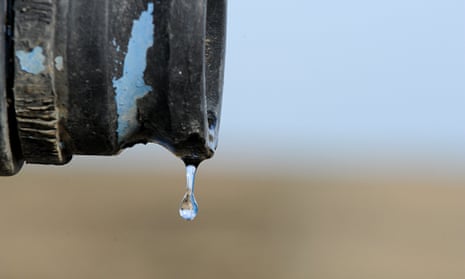So far, the big news this year has been all about oil. And for good reason: the recent drop in petrol prices has caused widespread economic and geopolitical dislocation for producers and consumers alike. Analysts, traders and commentators have watched their fortunes ebb and flow, speculating on what happens next. But during all the action, you might have missed an even bigger story: water, not oil, could be the real commodity to watch in 2015.
In its tenth annual Global Risks report released last week, the World Economic Forum (WEF) – hardly a group of dyed-in-the-wool environmentalists – identified water crises as the most serious global threat in terms of impact on business and society, outranking infectious disease, proliferation of weapons of mass destruction, and yes – energy price shocks.
Farmers in California or flood victims in China don’t need an elite Swiss thinktank to tell them to worry about water, but for the rest of the world, the finding is a call to action to build resilience to water-related risks.
The underlying facts are not new. Studies from the World Resources Institute show that power plants and commercial buildings around the world are at risk from diminished water supplies. Harmful algal blooms fuelled by water pollution are getting so large that they are visible from space. We have exploited surface water to the point that thousands of rivers have literally vanished from the map.
WEF’s Global Risks report affirms a point scientists have been making for years: water is not only an economic and environmental threat, but also an existential one. The public agrees; according to the Xylem Value of Water Index, the majority of Americans (77%) are concerned about the state of US water infrastructure, and 61% are willing to pay more to fix it. The missing ingredient has been political will.
The good news? This year will present world leaders with an opportunity to make real progress on water. In 2015, we will see a remarkable convergence of global negotiations on international development, climate change and trade. In September, heads of state will meet at the United Nations to define new sustainable development goals to guide global poverty reduction efforts. Two months later they will meet in Paris to set historic commitments on climate change mitigation and adaptation, and shortly thereafter in Nairobi to advance discussions on trade liberalisation. While the scope of these discussions is broad, taken together they present a compelling global opportunity to build resilience to water risk – if decision-makers have the courage to seize the moment.
To begin with, world leaders should ensure that the sustainable development goals include a focus on “securing sustainable water for all” – and define quantitative, time-bound stretch targets that make this a specific objective rather than an unmeasurable statement of intent. To properly address water risk, these targets should extend beyond access to clean water and sanitation to include wastewater treatment, nutrient pollution, water reuse and disaster vulnerability – all areas that UN-Water, the UN’s expert network, has highlighted as critical to reducing global vulnerability to water risk.
Second, policymakers should ensure that commitments taken in Paris reflect water-related climate change mitigation and adaptation opportunities. On the mitigation front, governments should commit to upgrading current water and wastewater systems – which consume as much as 8% of power generated and emit powerful greenhouse gases, such as methane and nitrous oxide – to more energy-efficient solutions that can reduce these emissions and improve water quality.
On the adaptation front, they should commit to strengthening the global hydrological monitoring system (a technical topic that is nevertheless essential to monitoring near-term disasters and long-term change) and accelerating public-private cooperation on ways to increase resilience to natural disasters such as rising sea levels, floods and drought.
And finally to Nairobi. In my opinion, the World Trade Organisation should conclude efforts to liberalise trade in environmental goods and services. Reducing barriers to trade in even a small part of the $750bn (£495bn) global market for water-related goods and services could help reduce the cost of addressing water challenges and accelerate valuable diffusion of knowledge and experience across regions.
Of course, global water risk can’t be solved simply by successful negotiations in world capitals – grassroots efforts by NGOs, entrepreneurs and community organisations are every bit as important. But for an issue where political will has long been the constraint to change, focusing our leaders on the global water crisis can help to make 2015 a badly needed watershed year for the world.
Albert Cho is vice-president for strategy and business development at Xylem, a global water technology company focused on providing solutions to some of the world’s biggest water challenges
The water hub is funded by Grundfos. All content is editorially independent except for pieces labelled ‘brought to you by’. Find out more here.
This content is brought to you by Guardian Professional. Become a GSB member to get more stories like this direct to your inbox.
